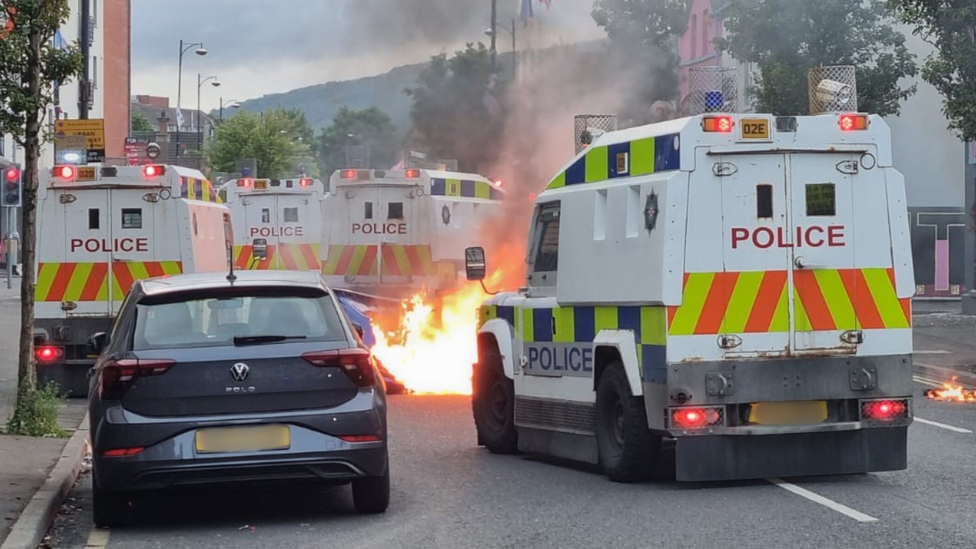'No place for racism in our society', says O'Neill
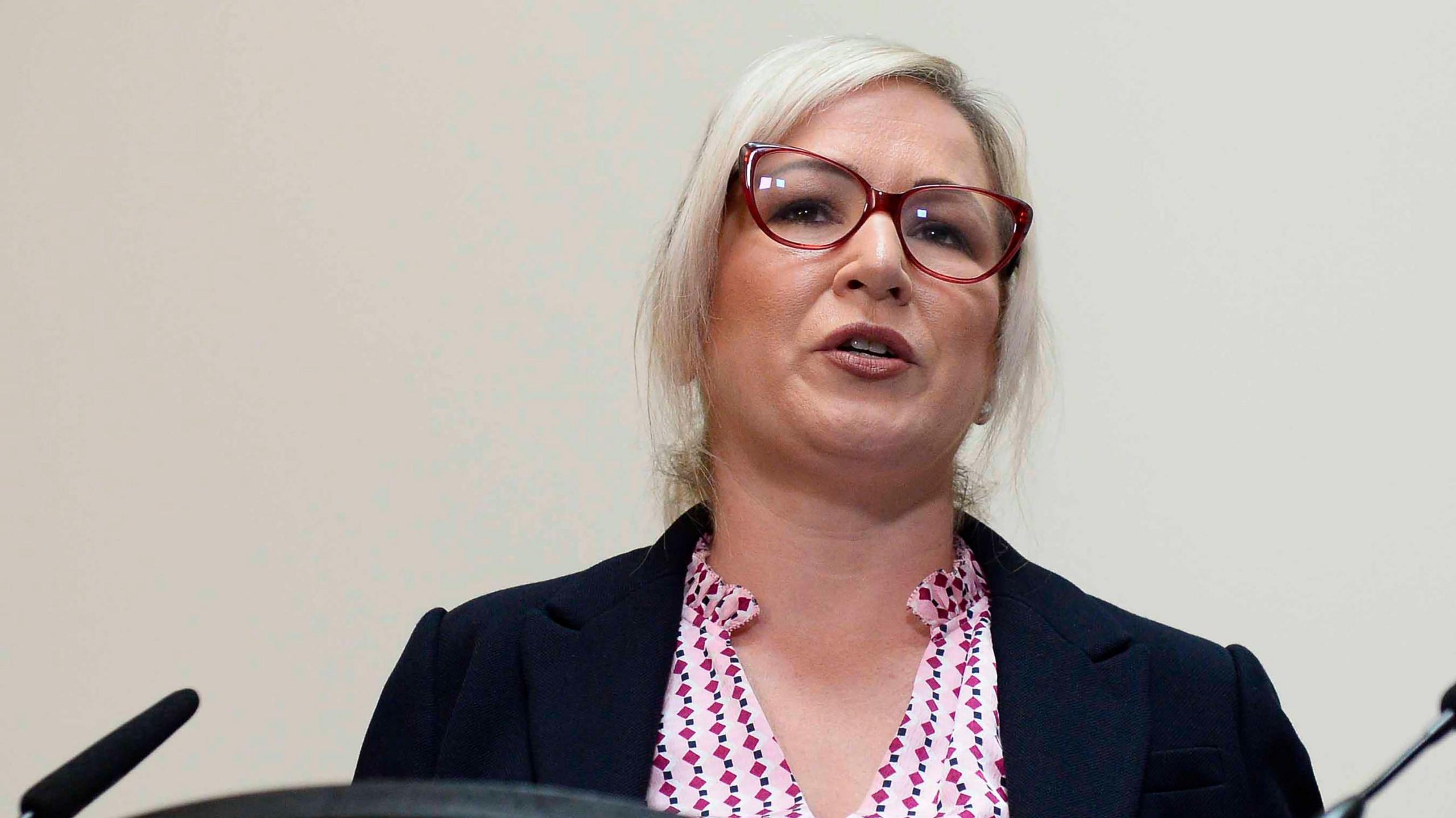
The first minister spoke about the "real human impact" of the violence
- Published
Executive ministers condemned recent violence ahead of the Northern Ireland Assembly being recalled.
First Minister Michelle O’Neill said the executive is “unequivocally” collective in its determination to say no to racism.
She said there is “no place for racism in our society”, adding that it is “absolutely wrong”.
On Thursday afternoon during the recall, MLAs backed an Alliance motion, external condemning the recent disorder and rejecting “all forms of racism” in Northern Ireland.
Violence is 'wrong'
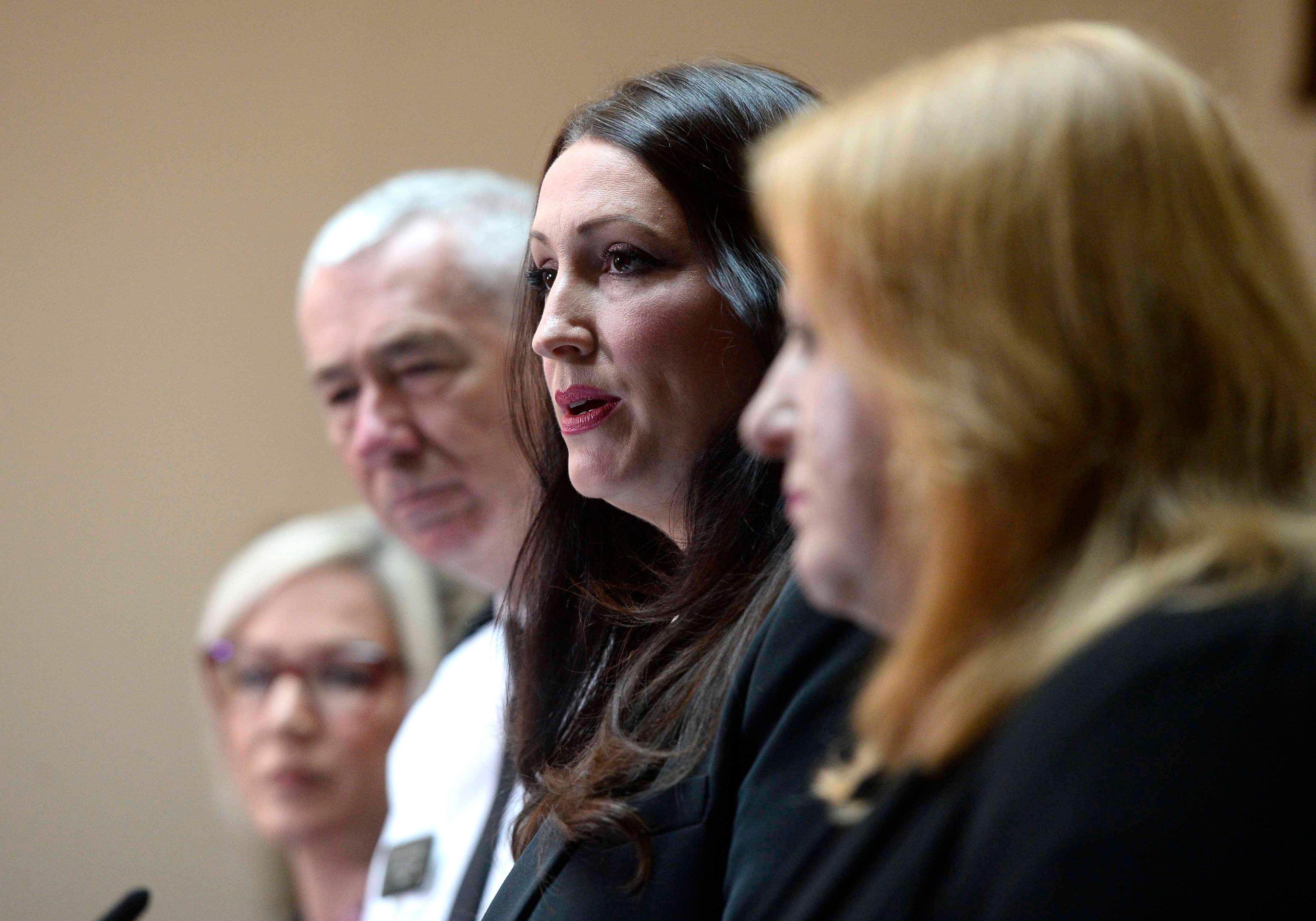
Deputy First Minister Emma Little-Pengelly said violence is always "wrong"
Ms O’Neill said people from ethnic minorities were afraid to go about their normal routines.
“We have healthcare workers who are afraid to go to their work, we have nurses who are afraid to go home,” she said.
That is “the real human impact” of this type of racist activity, she added.
Deputy First Minister Emma Little-Pengelly said Northern Ireland's political parties were "sending a strong and united message against violence, disorder and racism".
The fact that some healthcare workers are thinking of leaving as a result of the violence is "deeply disturbing", Ms Little-Pengelly said, emphasising their "huge" contribution.
She also wanted to acknowledge the "positive contribution of many ethnic minority people" in Northern Ireland.
Violence is always "wrong" and "never the answer", she added.
'It is racism'
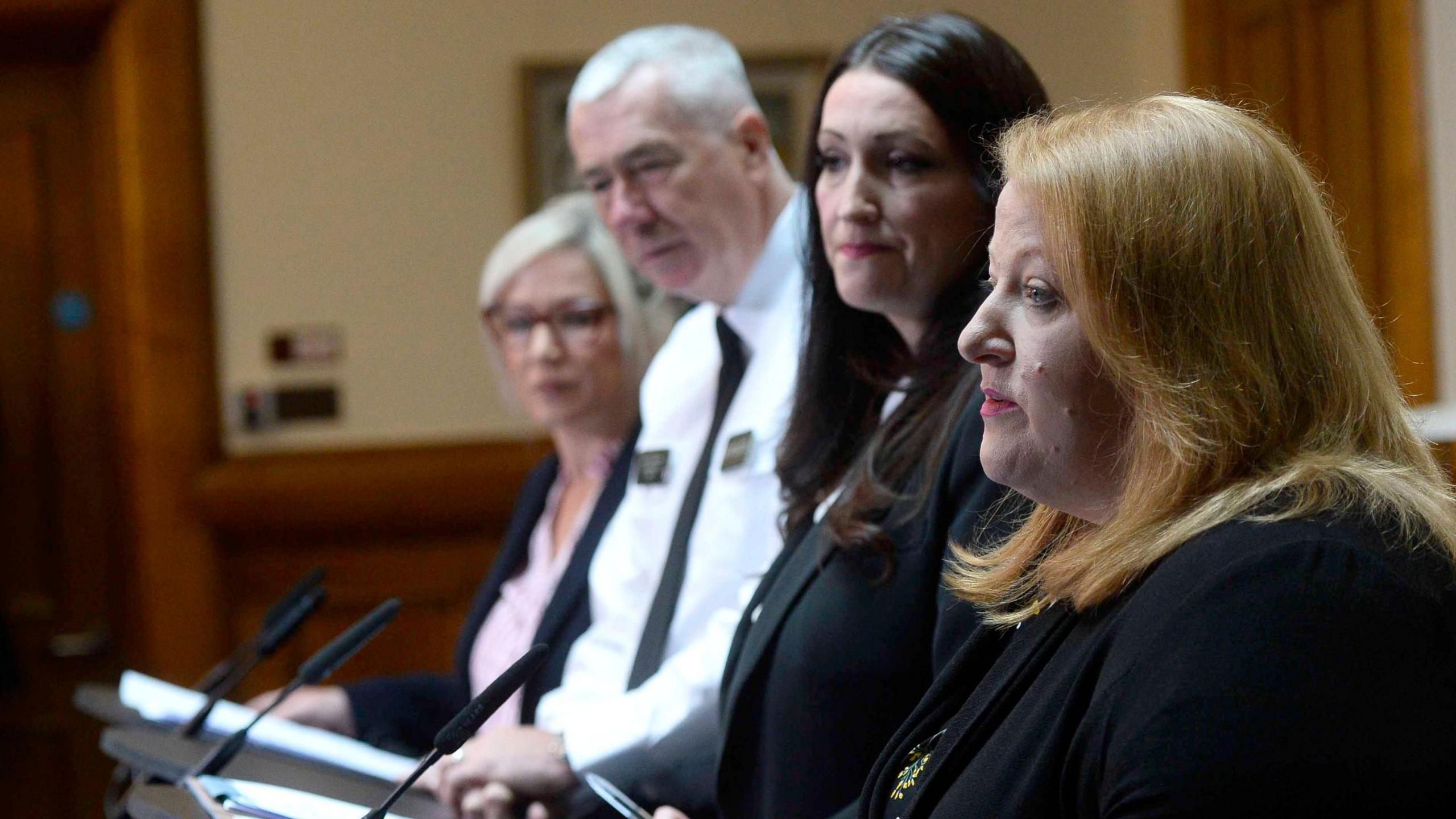
The justice minister said it is important to make people from ethnic minorities "welcome and safe”
Justice Minister Naomi Long said the disorder was not representative of the vast majority of people in Northern Ireland.
“We need to call it for what it is. It is racism; it is Islamophobia," she said.
"If we’re going to deal with it, we need to name it what it is, and we need to challenge it.”
The Alliance leader said the people being attacked are “part of our community” and “valued”.
“It is incumbent on all of us in political leadership, but also all of us as a community to make them feel that they are welcome and safe,” she added.
Analysis: MLAs recalled to reflect
By Jayne McCormack, BBC News NI political correspondent
It's not often you hear a round of applause in the assembly chamber.
But that happened on several occasions on Thursday as MLAs reflected on events of the past week.
Members of minority community groups sat and watched in the public gallery as politicians addressed them directly, offering words of support and of condemnation against what has happened so far.
While recall debates are often described as little more than talking shops, many felt the seriousness of the situation demanded our politicians' presence today.
Politicians may struggle in the short-term to change attitudes, but there is pressure on the executive to act in certain policy areas, such as updating racial equality strategies.
Strategies which at surface level may not mean much, have practical consequences for how those communities are represented and the access to services they get.
There is also the question of better resources for the PSNI.
Yesterday, when I asked the secretary of state could he commit to improved funding for the organisation, he said it was a matter for the executive to prioritise what they already have for this year.
Today, the first and deputy first ministers told me they're still fighting to get the Treasury to improve our funding formula and insisted the PSNI will not be "alone" in tackling this issue.
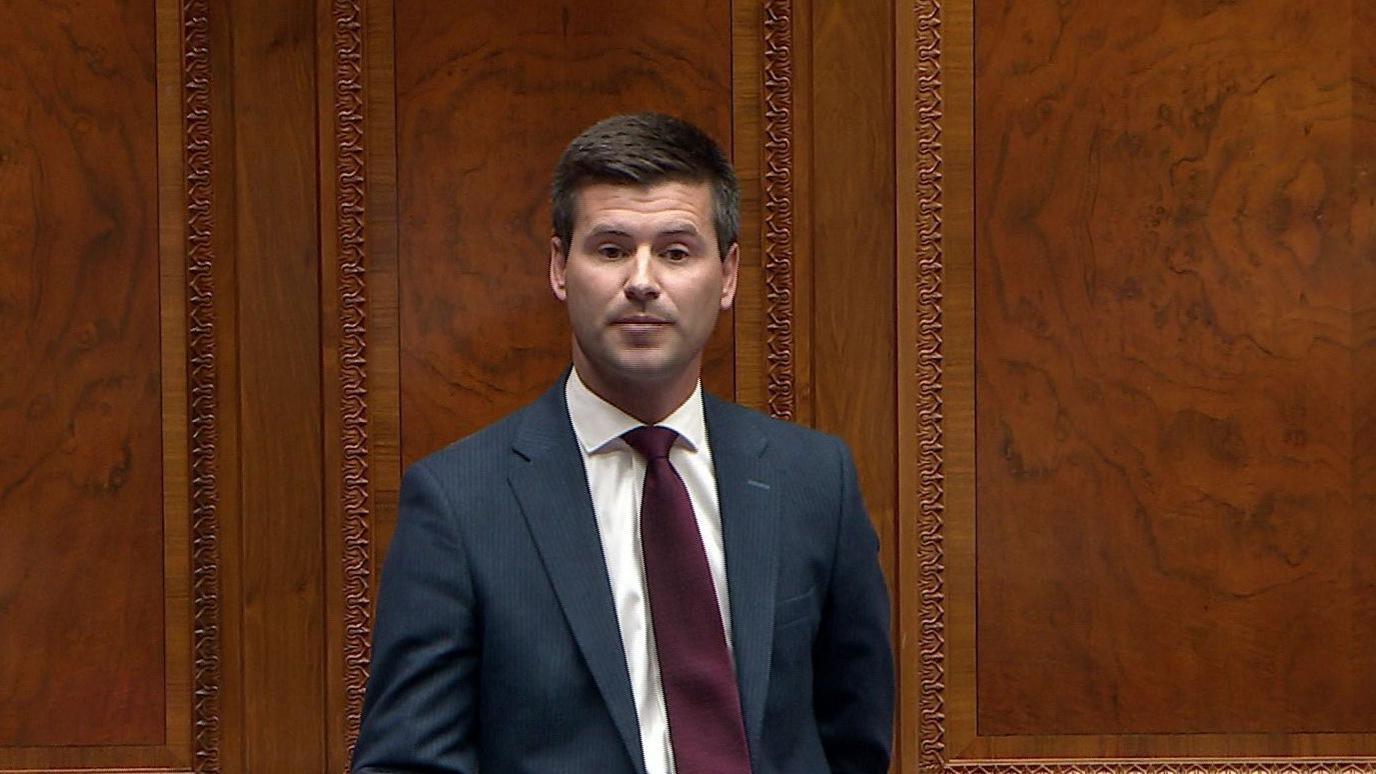
Jonathan Buckley expressed his sympathy for the families of the victims of the knife attack in Southport
Speaking in the assembly, DUP MLA for Upper Bann, Jonathan Buckley, said he wanted to make it “crystal clear” that he condemned the violence “on our streets and across the United Kingdom”.
He expressed his sympathy for the families of the victims of the knife attack in Southport on 29 July in which three young girls died.
SDLP South Belfast MLA Matthew O’Toole welcomed members of the Muslim community to the assembly chamber.
“We owe them an apology for what they and their community have had to endure in this society and city over recent weeks and days,” he said.
'It has to stop now'
Meanwhile, Ulster Unionist Steve Aiken praised the work of ethnic minority health workers, saying he spent several hours in Antrim Area Hospital on Wednesday with one of his children.
He said those in the emergency department were grateful for the "professional medical care they were receiving".
Mr Aiken said some "very misguided" people thought it was appropriate to attack immigrants.
"It has to stop, it has to stop now," he stressed.
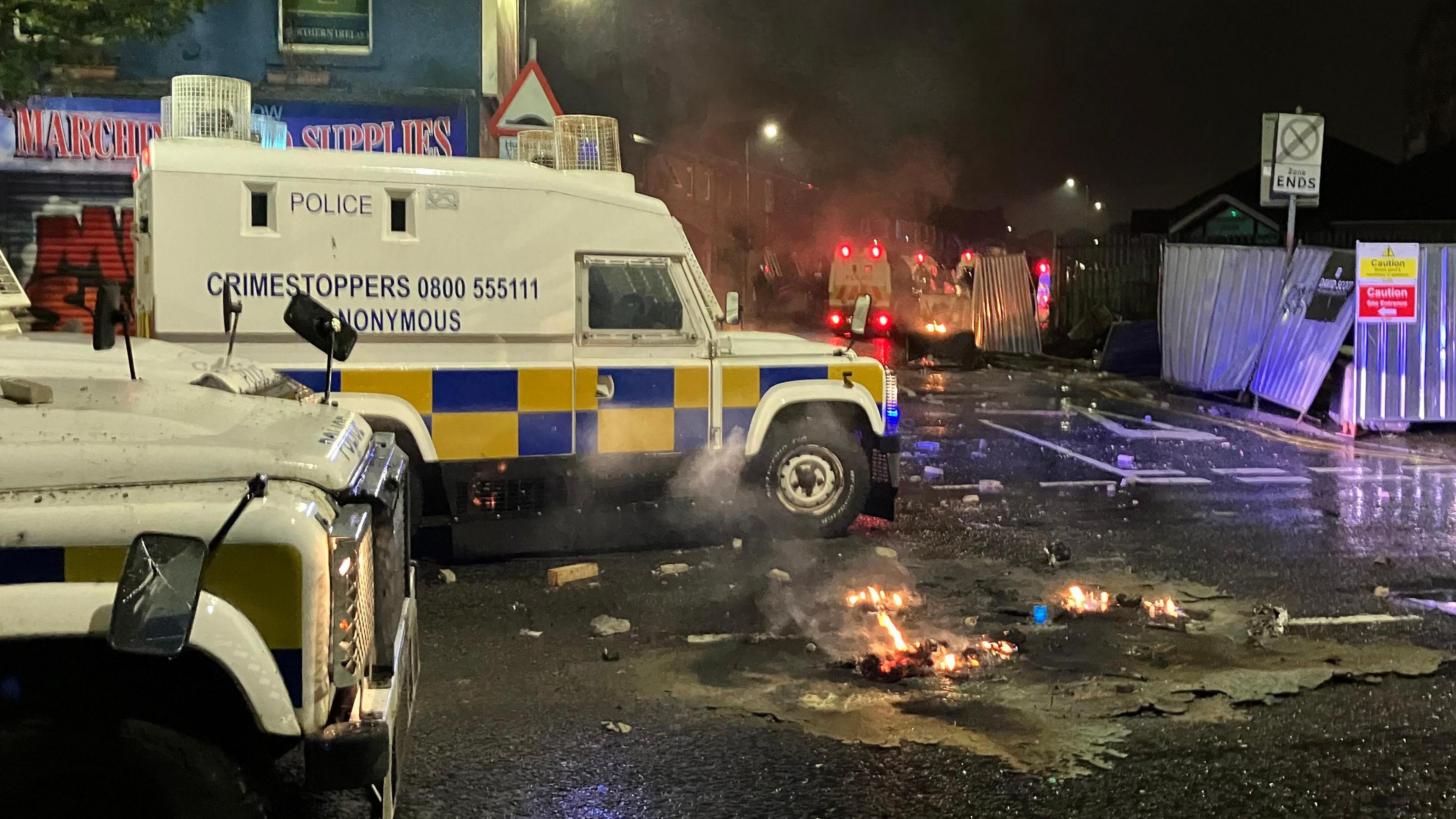
Since the weekend, there have been consecutive nights of violence in various parts of Belfast
The Northern Ireland Assembly was recalled following a successful petition, put forward by the Alliance Party.
This meant MLAs have returned from their summer break to discuss recent disorder.
It follows a spate of violence, with several businesses in the city attacked after an anti-immigration protest erupted into disorder.
The first minister and deputy first ministers have said their joint priority is to face down racism and intimidation.
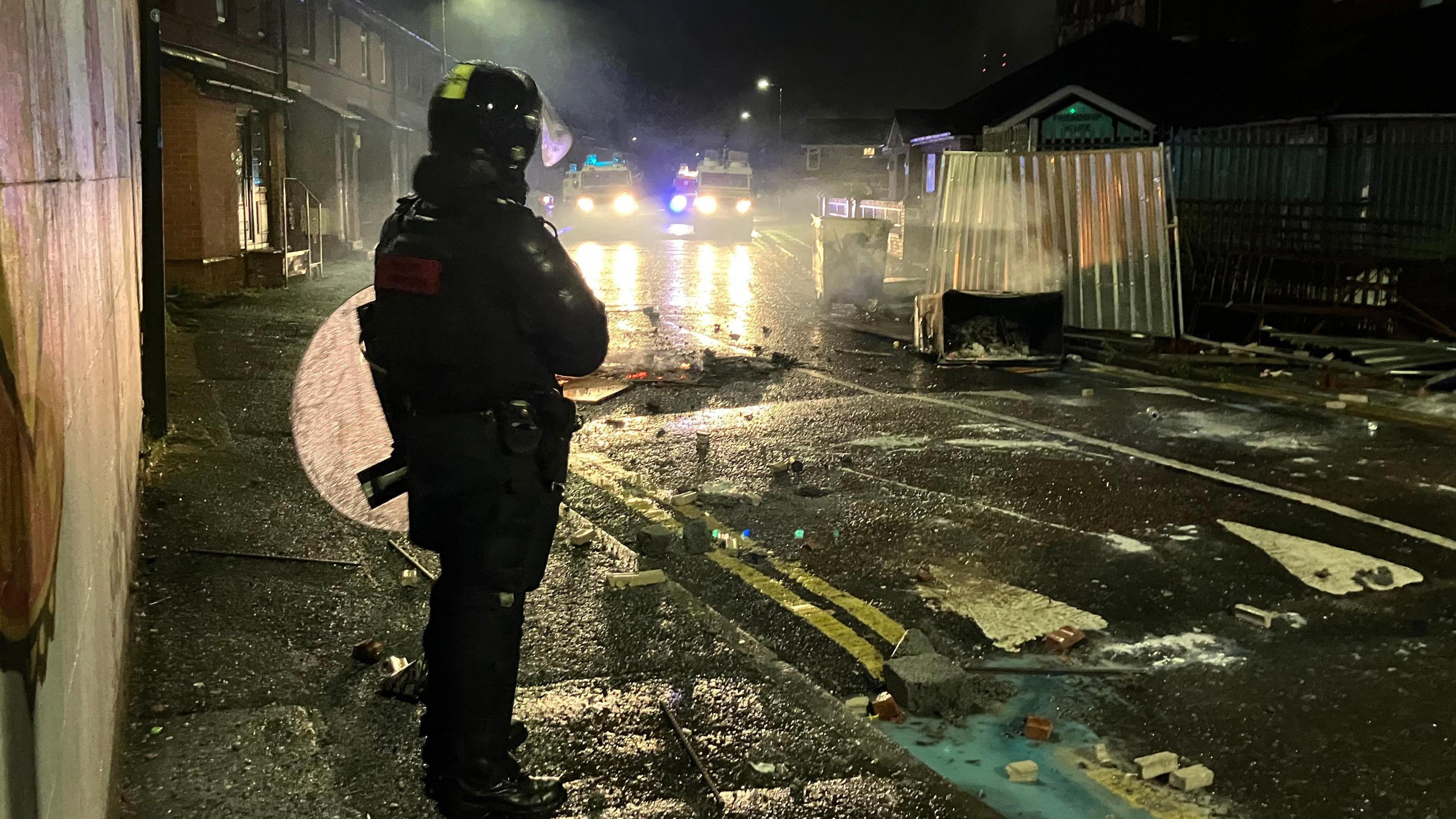
The justice minister defended the PSNI's approach but said certain instances of disorder were “sporadic” and "harder for police to keep on top of"
What prompted the recall?
There has been violent disorder in towns and cities across the UK since last Tuesday, the day after three young girls were killed in Southport.
False claims on social media followed that someone who had arrived in the UK illegally was to blame.
On Saturday, a cafe was set alight and several businesses were attacked after disorder broke out in Belfast.
Violence also erupted on Monday, Tuesday and Wedsnesday night in the city.
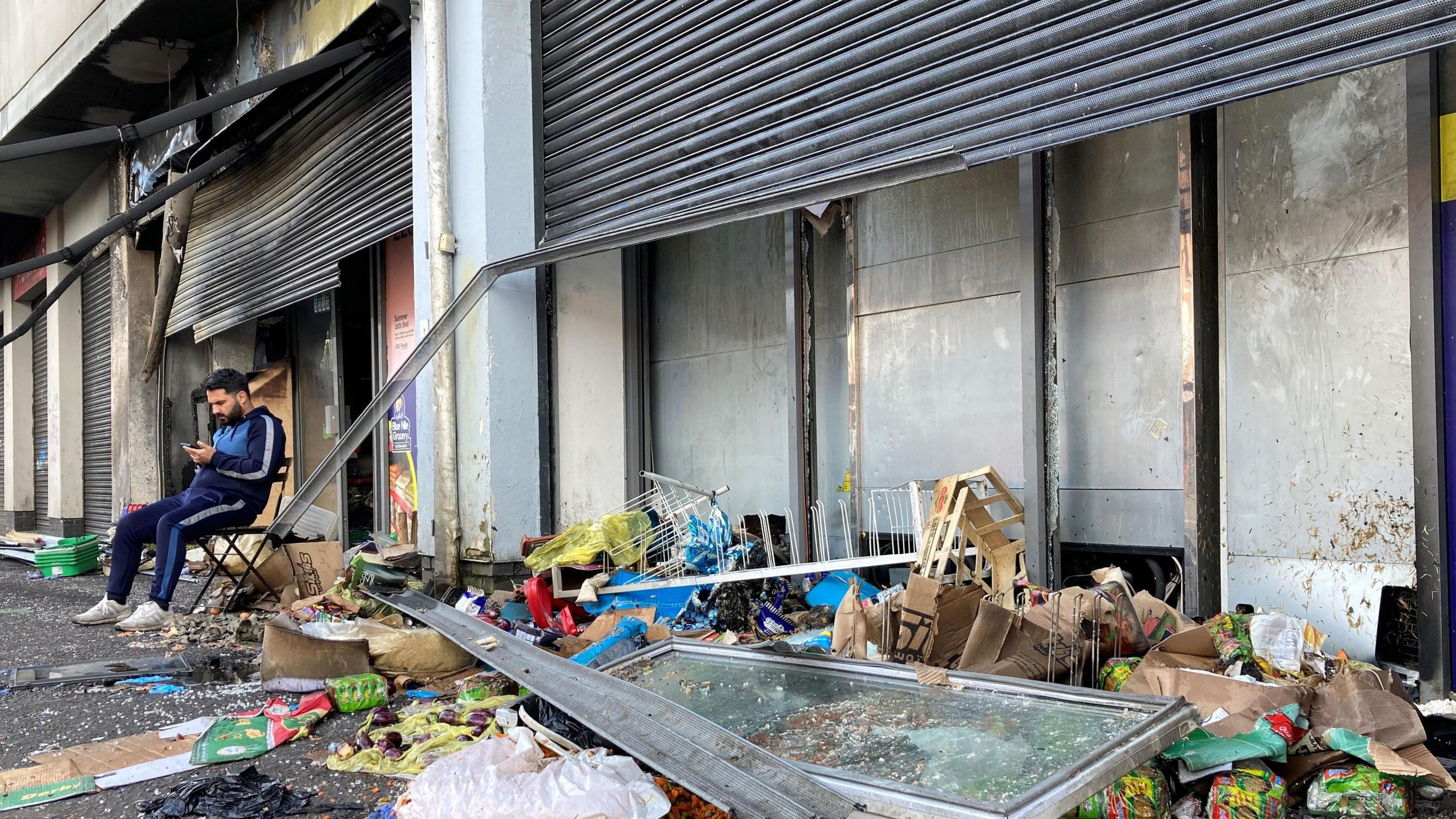
A number of businesses run by ethnic minorities have been targeted during riotous protests
Resources stretched
Assembly members debated a motion from the Alliance Party that called on the assembly to condemn the criminal damage and "targeting of businesses" at the weekend.
It also called on MLAs to recognise that PSNI resources are stretched and "could have been much more effectively deployed elsewhere".
The move by Alliance to recall the assembly from its summer break was backed by Sinn Féin, the SDLP and independent unionist Claire Sugden.
On Monday, Sinn Féin's Deirdre Hargey said First Minister Michelle O'Neill was cutting short a family holiday to return to the assembly for the debate.
What could Stormont do?
Immigration is a matter largely reserved for Westminster, but there have been calls for the Executive Office to do more to help refugees living in Northern Ireland.
The recall motion also called on the first minister and deputy first ministers to finalise a Refugee Integration Strategy by the end of this year, and replace an "outdated" Racial Equality Strategy.
Unlike England, Scotland and Wales, Northern Ireland has no refugee integration strategy.
A public consultation on a draft strategy, external took place in February 2022, but the power-sharing executive collapsed during that time and the institutions remained suspended for two years.
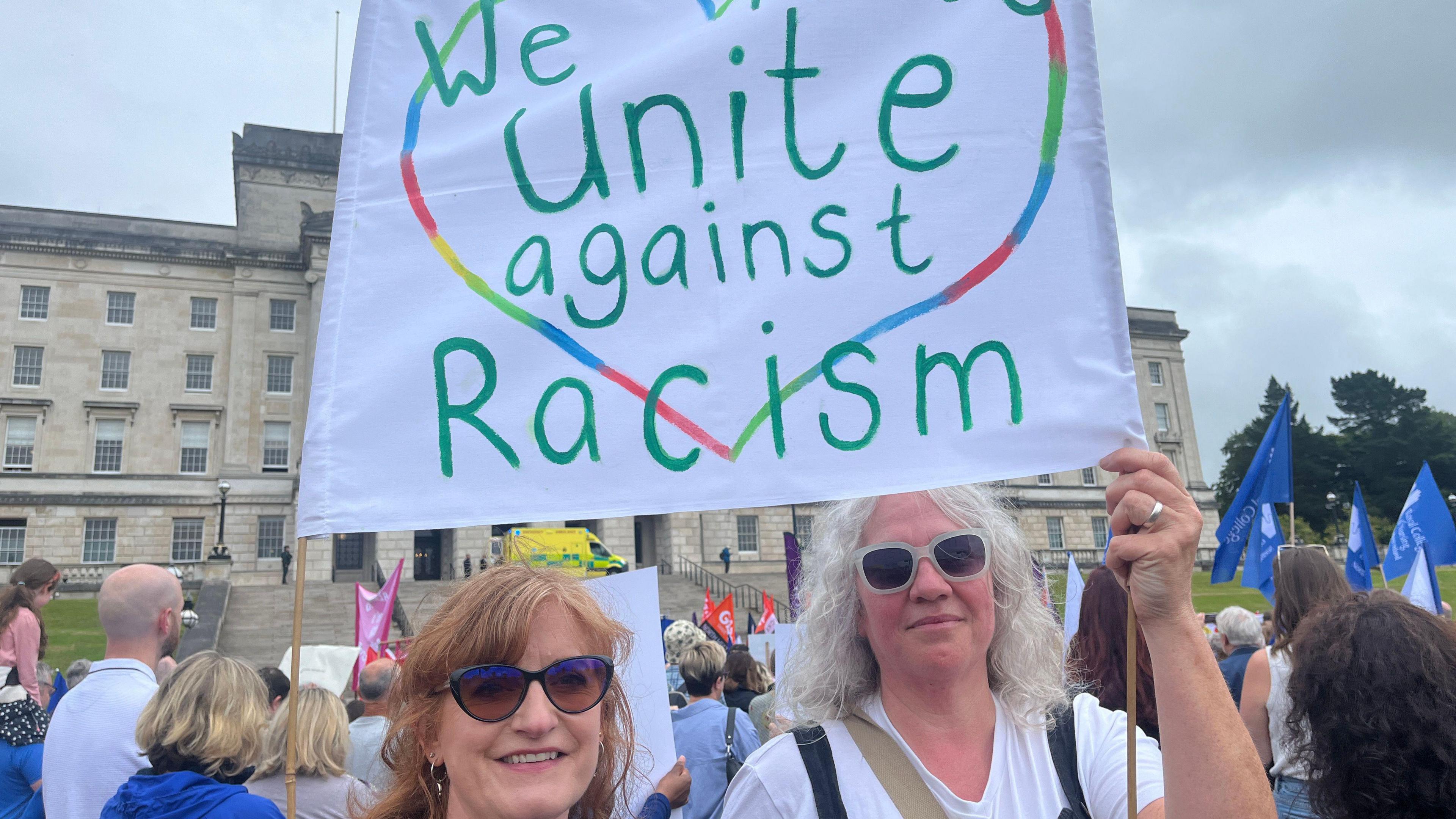
An anti-racism rally organised by trade unions and community groups was held outside Parliament Buildings at Stormont
On Thursday, an anti-racism rally also took place outside Parliament Buildings where politicians reconvened to discuss the recent disorder and racist attacks.
The demonstration was organised by trade unions and community groups.
Meanwhile, hundreds of people attended an anti-racism rally in Guildhall Square in Londonderry on Wednesday evening.
Organisers said it was held to show solidarity with the migrant community of the north west in response to some of the violent scenes seen in Belfast and some areas in England in recent days.
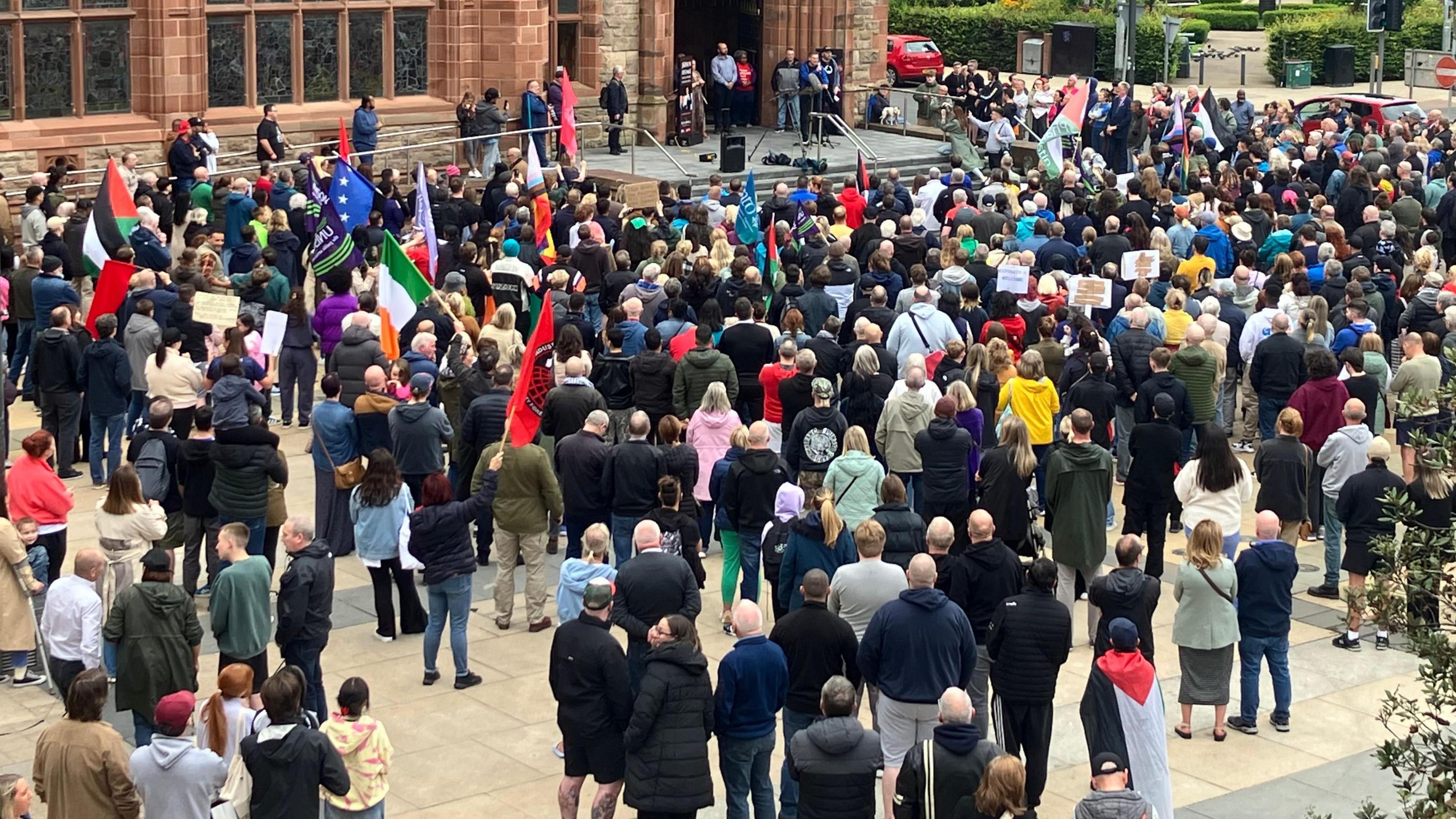
Hundreds of people attended an anti-racism rally in Guildhall Square in Londonderry on Wednesday evening
- Published5 August 2024
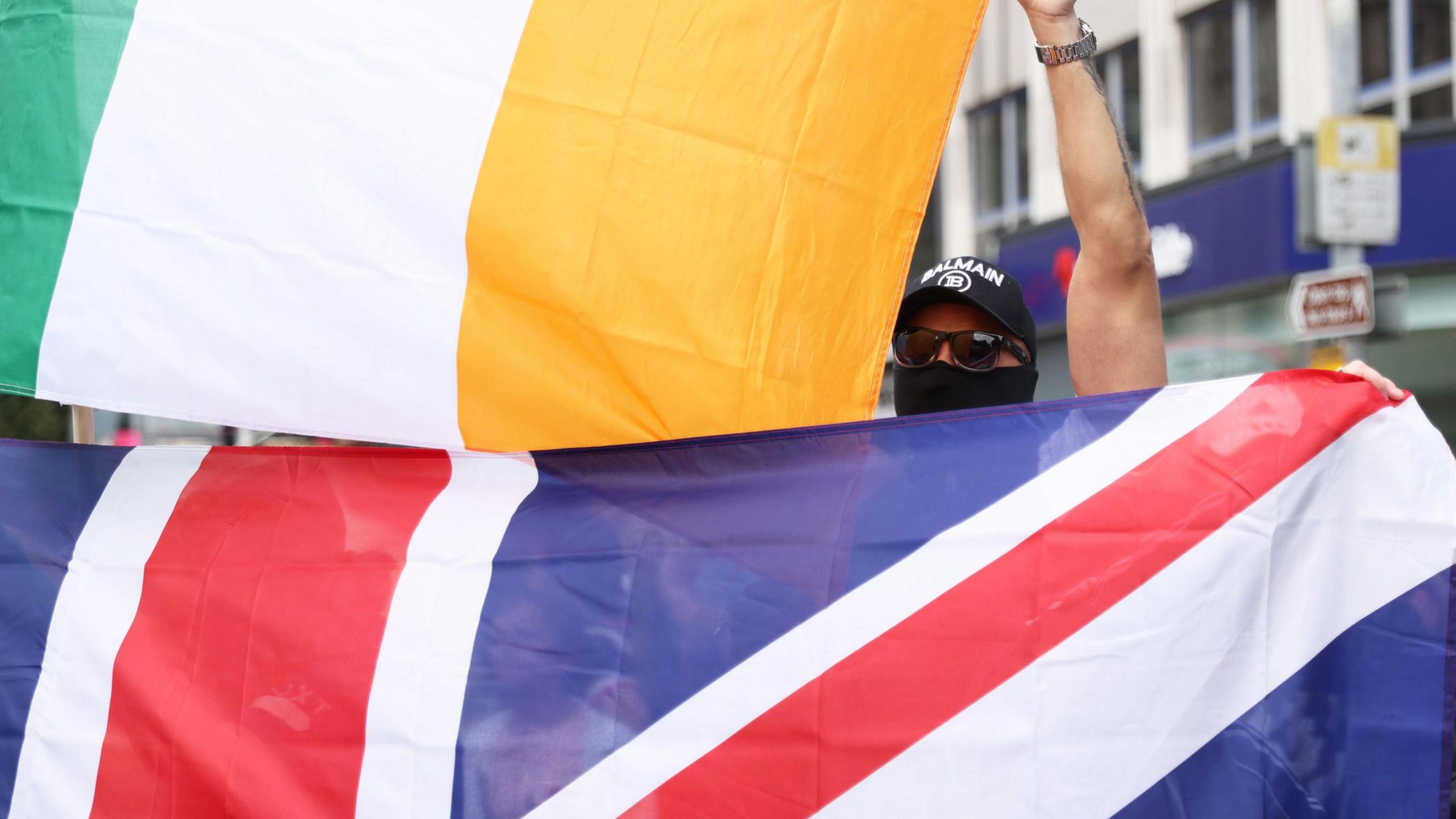
- Published5 August 2024
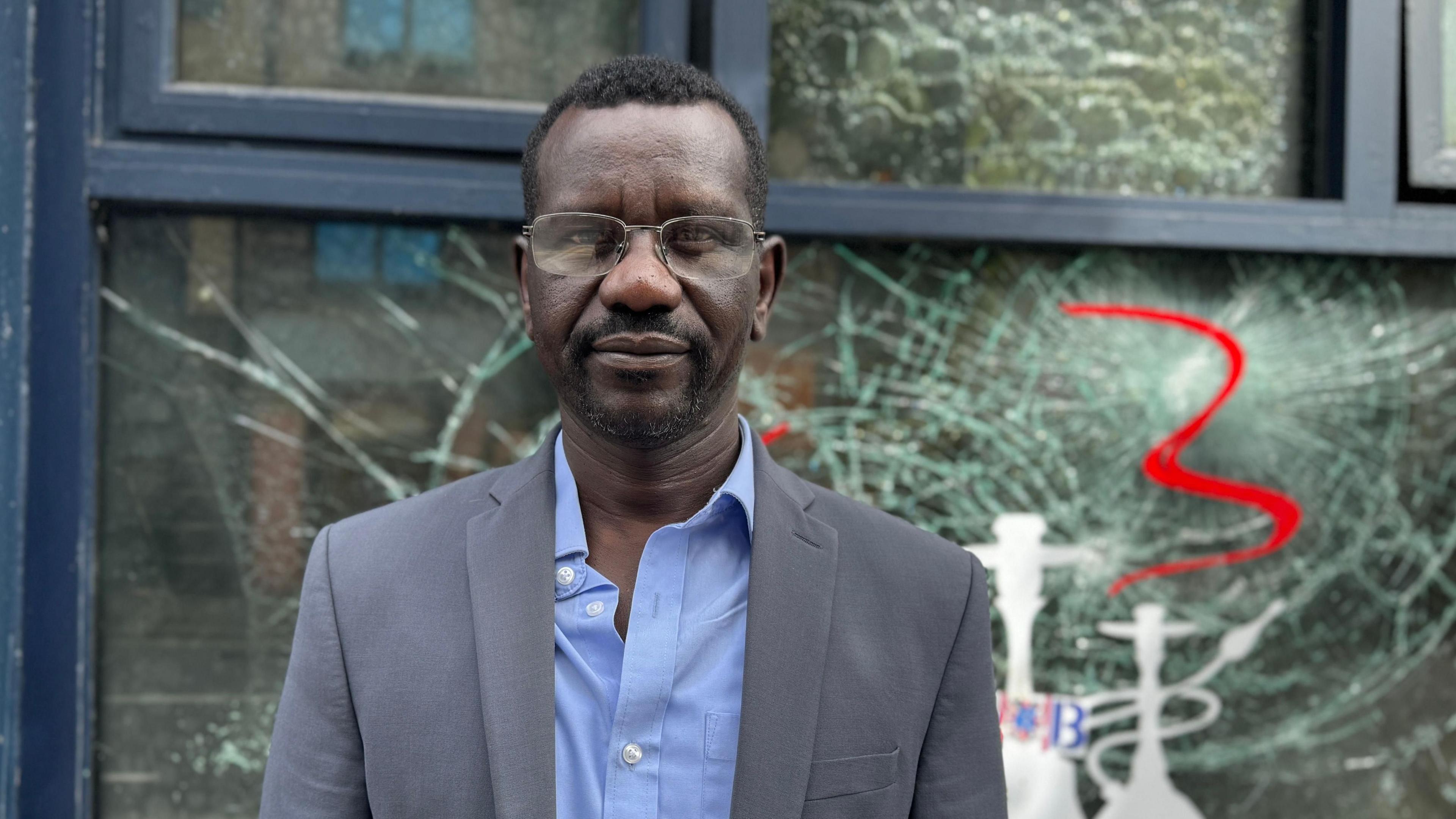
- Published5 August 2024
